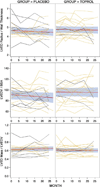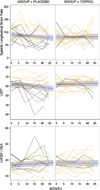A randomized controlled phase IIb trial of beta(1)-receptor blockade for chronic degenerative mitral regurgitation
- PMID: 22818065
- PMCID: PMC3914413
- DOI: 10.1016/j.jacc.2012.04.029
A randomized controlled phase IIb trial of beta(1)-receptor blockade for chronic degenerative mitral regurgitation
Abstract
Objectives: The purpose of the study was to evaluate the effect of long-term β(1)-aderergic receptor (AR) blockade on left ventricular (LV) remodeling and function in patients with chronic, isolated, degenerative mitral regurgitation (MR).
Background: Isolated MR currently has no proven therapy that attenuates LV remodeling or preserves systolic function.
Methods: Thirty-eight asymptomatic subjects with moderate to severe, isolated MR were randomized either to placebo or β(1)-AR blockade (Toprol-XL, AstraZeneca, London, United Kingdom) for 2 years. Magnetic resonance imaging with tissue tagging and 3-dimensional analysis was performed at baseline and at 6-month intervals for 2 years. Rate of progression analysis was performed for endpoint variables for primary outcomes: LV end-diastolic volume/body surface area, LV ejection fraction, LV end-diastolic (ED) mass/ED volume ratio, LV ED 3-dimensional radius/wall thickness; LV end-systolic volume/body surface area, LV longitudinal strain rate, and LV early diastolic filling rate.
Results: Baseline LV magnetic resonance imaging or demographic variables did not differ between the 2 groups. Significant treatment effects were found on LV ejection fraction (p = 0.006) and LV early diastolic filling rate (p = 0.001), which decreased over time in untreated patients on an intention-to-treat analysis and remained significant after sensitivity analysis. There were no significant treatment effects found on LV ED or LV end-systolic volumes, LV ED mass/LV ED volume or LV ED 3-dimensional radius/wall thickness, or LV longitudinal strain rate. Over 2 years, 6 patients treated in the placebo group and 2 patients in the β(1)-AR blockade group required mitral valve surgery (p = 0.23).
Conclusions: β(1)-AR blockade improves LV function over a 2-year follow-up in isolated MR and provides the impetus for a large-scale clinical trial with clinical outcomes. (Molecular Mechanisms of Volume Overload-Aim 1 [SCCOR in Cardiac Dysfunction and Disease]; NCT01052428).
Copyright © 2012 American College of Cardiology Foundation. Published by Elsevier Inc. All rights reserved.
Figures



Comment in
-
Beta-blockade for mitral regurgitation: could the management of valvular heart disease actually be moving into the 21st century?J Am Coll Cardiol. 2012 Aug 28;60(9):839-40. doi: 10.1016/j.jacc.2012.04.028. Epub 2012 Jul 18. J Am Coll Cardiol. 2012. PMID: 22818062 No abstract available.
References
-
- Enriquez-Sarano M, Akins CW, Vahanian A. Mitral regurgitation. Lancet. 2009;373:1382–1394. - PubMed
-
- Borer JS, Bonow RO. Contemporary approach to aortic and mitral regurgitation. Circulation. 2003;108:2432–2438. - PubMed
-
- Bonow RO, Carabello BA, Chatterjee K, et al. ACC/AHA 2006 guidelines for the management of patients with valvular heart disease: a report of the American College of Cardiology/American Heart Association Task Force on Practice Guidelines. J Am Coll Cardiol. 2006;48(3):e1–e148. - PubMed
-
- Nagatsu M, Zile MR, Tsutsui H, et al. Native β-adrenergic support for left ventricular dysfunction in experimental mitral regurgitation normalizes indexes of pump and contractile function. Circulation. 1994;89:818–826. - PubMed
-
- Hankes GH, Ardell JL, Tallaj J, et al. Beta1-adrenoceptor blockade mitigates excessive norepinephrine release into cardiac interstitium in mitral regurgitation in dog. Am J Physiol. 2006;291(1):H147–H151. - PubMed
Publication types
MeSH terms
Substances
Associated data
Grants and funding
LinkOut - more resources
Full Text Sources
Other Literature Sources
Medical
Research Materials

